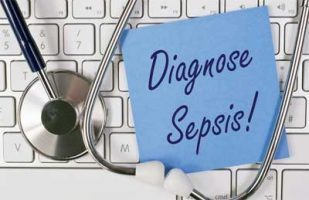- Home
- Editorial
- News
- Practice Guidelines
- Anesthesiology Guidelines
- Cancer Guidelines
- Cardiac Sciences Guidelines
- Critical Care Guidelines
- Dentistry Guidelines
- Dermatology Guidelines
- Diabetes and Endo Guidelines
- Diagnostics Guidelines
- ENT Guidelines
- Featured Practice Guidelines
- Gastroenterology Guidelines
- Geriatrics Guidelines
- Medicine Guidelines
- Nephrology Guidelines
- Neurosciences Guidelines
- Obs and Gynae Guidelines
- Ophthalmology Guidelines
- Orthopaedics Guidelines
- Paediatrics Guidelines
- Psychiatry Guidelines
- Pulmonology Guidelines
- Radiology Guidelines
- Surgery Guidelines
- Urology Guidelines
New Test To Rapidly Diagnose Sepsis

Researchers have developed a test that can rapidly and reliably diagnose sepsis, a potentially life-threatening complication of bacterial infections.
Rapid diagnosis of sepsis in hospitalized patients is crucial because in severe cases, there is an average 7.6% decrease in survival rate per hour from the onset of low blood pressure without effective antimicrobial treatment. Early identification of a pathogen increases the chance of targeting the correct agent and may avoid misuse of antibiotics.
In a Journal of Clinical Laboratory Analysis study, investigators describe what is called a TaqMan-Based Multiplex real-time PCR detection system, which allowed for rapid detection of 10 of the most frequent bacterial pathogens from blood samples.
"Interestingly, pathogens in some blood culture-negative cases of sepsis patients were still detected in this study. We speculate that the residual DNA fragments of the bacteria might be detected by this system even if they were destroyed by antibacterial drugs or the immune system," said Dr. Bing Zhang, senior author of the study.
For more details click on the link : http://onlinelibrary.wiley.com/doi/10.1002/acr.23250/abstract

Disclaimer: This site is primarily intended for healthcare professionals. Any content/information on this website does not replace the advice of medical and/or health professionals and should not be construed as medical/diagnostic advice/endorsement or prescription. Use of this site is subject to our terms of use, privacy policy, advertisement policy. © 2020 Minerva Medical Treatment Pvt Ltd